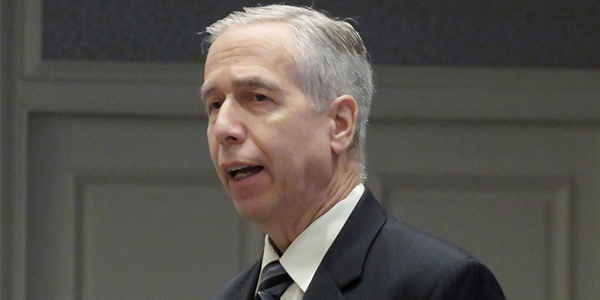By Rich Heidorn Jr.
ATLANTA — The ballroom at NERC’s Human Performance Conference was pin-drop quiet Wednesday as Joseph W. Pfeifer, former chief of counterterrorism and emergency preparedness for the New York City Fire Department, gave an hourlong speech recounting his experience leading firefighters into the World Trade Center on Sept. 11, 2001.
Pfeifer’s experience was captured in brothers Gédéon and Jules Naudet’s documentary, “9/11.”
One of the filmmakers accompanied Pfeifer, then a battalion chief, as he and his men rushed to the World Trade Center after the North Tower was hit by the first highjacked airliner at 8:46 a.m. The film captured the chaos and confusion when the second plane hit the South Tower at 9:03 a.m., then the collapse of the South Tower at 9:59 a.m., which left the glass-walled lobby of the North Tower pitch black.
It was then that Pfeifer ordered his firefighters to abandon rescue efforts and evacuate the North Tower, he told the conference, which was co-hosted by the Department of Energy and the North American Transmission Forum.
“That sounds like a simple order when you look back in hindsight. I had no idea that the whole [South Tower] had collapsed. I thought the only people in trouble were us. But giving an order where you are pulling the rescuers out and leaving a thousand people behind is not an easy order at all. But it’s using that two parts of the brain — the intuitive part and the analytical part.”
Pfeifer was back out on the street when the second tower collapsed at 10:28 a.m., sending him and others running away.
Pfeifer said the event illustrated “organizational bias” — how firefighters, EMTs and police tend to stay in their own groups even when working together.
After the first tower collapsed, police in a helicopter circling the North Tower reported that the building’s top 15 floors were “turning red” and the corner of the building was starting to buckle. “‘Pull everybody back three blocks,’” Pfeifer said the copter warned, fearing the second building’s collapse.
“That message never got through to the fire department, and the fire department never asked,” Pfeifer said. “Here you have two great organizations — NYPD and FDNY — and they didn’t talk to each other at the most critical time.”
Some 71 law enforcement officers and 343 firefighters — including Pfeifer’s brother — died that day, along with almost 3,000 civilians. Among those killed were the top-ranking firefighter on the scene and other command chiefs.
“We had no command staff. They were all gone. So how do you re-establish command?” Pfeifer asked.
After the second building toppled, Pfeifer recalled, his immediate boss, Deputy Assistant Chief Peter Hayden, got on top of a burned-out fire truck and gathered the surviving firefighters and reinforcements together.
“The chief said, ‘I want you to take off your helmets, and we’re going to have a moment of silence, because we lost a lot of people today,’” Pfeifer recalled. “And we took off our helmets.
“And then he asked us to put back on our helmets. And in the moment of putting back on the helmets, he re-established command, because there was a lot of stuff to do. There were rescues to be made, and fires to be put out. But what he did, he used what I’m calling now ‘crisis empathy.’ … He listened to what we were feeling.
“We knew it was bad, and we knew we lost a lot of people, but by him being able to recognize that and then articulate it, [it] made all the difference in the world and it re-established command. So, sometimes those small gestures mean a lot more than it sounds.”







